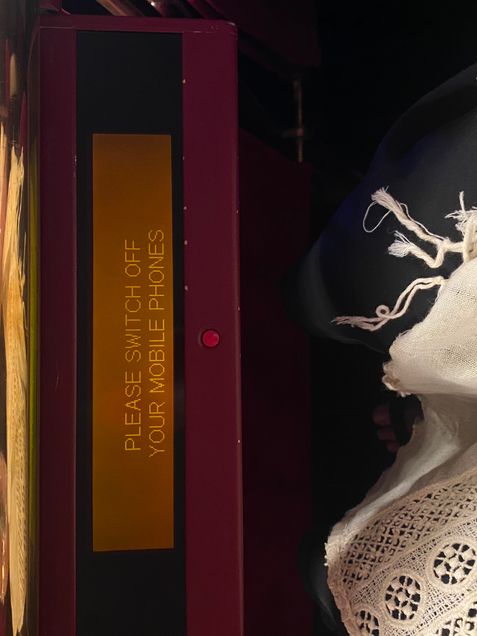March 16. Liceu’s Messiah
By Ann Li
Today, we visited the Gran Teatre del Liceu to watch a performance of Mozart’s adaptation of Handel’s Messiah (Der Messias), an oratorio commenting on the nativity and resurrection of Jesus Christ. Written in 1741, this is one of the most frequently performed works in Western music.
The Liceu offered us a modern retelling of this story, juxtaposing the ornate and stunning architecture of the Liceu with a very cubist and minimalist stage setting. The stage was mainly defined by its lighting, which would change very coordinatedly with the singers’ movements, but was mainly horizontal and vertical, and always within the same length and pacing. This made for a sort of underwhelming staging, given that it was not very dense considering the size of unutilized space. Similarly, costuming was very simplified while following a very muted and limited color palette. These elements then almost disrupted the beauty of the Liceu’s construction and interior.
 While this is technically not an opera but an oratorio, meaning that there are no characters or direct speech, there is still a story being told here, as evident by the lyrics (as Mozart wrote this arrangement, they are in his native German, but screens both above the stage and in front of seats offer translations in three languages… they didn’t always work!). The visuals, then didn’t always feel connected to the lyrics nor support the implicit narrative. If you don’t know the biblical references or the story of the coming of Jesus Christ, what could you understand and learn simply based off of what is on stage?
While this is technically not an opera but an oratorio, meaning that there are no characters or direct speech, there is still a story being told here, as evident by the lyrics (as Mozart wrote this arrangement, they are in his native German, but screens both above the stage and in front of seats offer translations in three languages… they didn’t always work!). The visuals, then didn’t always feel connected to the lyrics nor support the implicit narrative. If you don’t know the biblical references or the story of the coming of Jesus Christ, what could you understand and learn simply based off of what is on stage?
I was very happy to see a full house with a mix of age ranges. I thought of Liceu’s General Director Valenti Oviedo, who very proudly told us that recently,10,000 opera-goers were between the ages of 18-35. It makes me wonder, is this the kind of programming and artistic direction to keep this kind of attendance? I also thought about his comment on how opera survives because we all have a need for human connection and curiosity. At the time, I thought his comment regarding curiosity was meant positively, but I’m now realizing that maybe there is neutrality in the word. I loved watching everyone’s heads bob back and forth to lean over the balcony and glean at the stage, simultaneously– maybe you’re curiously happy when the soprano arrives, or curiously upset to see an astronaut appear (who was this?). Overall, it was a lovely experience with phenomenal music, and I’m glad we all had the chance to experience it!
